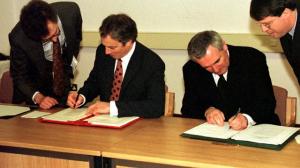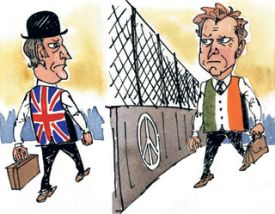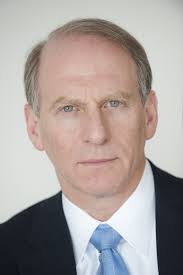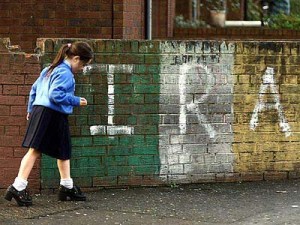“The Troubles” – a term long used to describe a time of violence and political unrest in Northern Ireland, from the late 60s to late 90s. For many in the Republic, the signing of the Good Friday Agreement in 1998 signaled an end to this terrible time.

Photo: bbc.co.uk
While the Good Friday Agreement was an important milestone in the recent history of the two countries, it by no means meant the end of “The Troubles”, but the start of the peace process; a difference that is important to distinguish.
Bridge Over Troubled Waters
From the beginning, there were issues in the process. The two years of talks which preceded the agreement were not truly inclusive of all parties in Northern Ireland. There were delays in implementing the agreement as Unionists refused to establish institutions of devolved government until there was movement on the decommissioning of paramilitary weapons; an issue which plagued the process for a year and a half.

Photo: fenian32.com
It took until 2005 until the International Commission on Decommissioning (IICD) reported that the IRA had rid itself of weapons. In the same year, Michael McDowell, then Irish Minister for Justice, said Gerry Adams, Martin McGuinness and Martin Ferris were all members of the IRA’s Army Council – allegations they deny to this day.
Ongoing Violence
Due to Unionist mistrust, a power-sharing executive was not entered into until the beginning of 2006 when Northern Ireland was finally ruled by appointed ministers.
That, however, did not mean the end of unrest. In May of the same year, a Catholic teenager died after being beaten with a baseball bat and a paramilitary member of the Ulster Volunteer Force (UVF) was shot in Antrim.
In 2007, for the first time in the party’s history, Sinn Féin voted to support policing in Northern Ireland and after 108 new members were elected to Stormont Assembly, the DUP and Sinn Féin held a breakthrough meeting in which they confirm power-sharing will return to Northern Ireland, hearlding the move as a “new era.”
Progress Plagued With Problems
The transfer of policing and judicial powers occurred in 2010 and the 2011 elections were praised for it’s focus on political and economic issues rather than “the troubles”. But that did not mean that all wounds had been healed.
This was evident in the appointment of Dr Richard Haass, a seasoned US diplomat, as peace envoy earlier this year, who was given the weighty task of trying to solve the issues of flags, parades, emblems and Northern Ireland’s violent past. Setting himself a Christmas deadline, Haass stated upon his appointment that he hoped to have an strong agreement between parties on these issues.

Photo: cfr.org
The issue of parading, in particular, by the Orange Order, has long been a sore point for the country and the street violence during the marching season in 2010 and 2011 were some of the worst in recent memory. Tensions were highlighted once again in 2012 following a decision by Belfast City Hall to fly the British flag only on designated days rather than all year-round, was followed by protests and some violence.

Photo: scoilursula.com
Although dissident republican groups don’t have the same capacity as they did in the 70s and 90s, they still remain an on-going threat to the process – continuing to recruit members, acquire weapons and target politicians. It is believed that a group formed only last year, calling itself “the IRA”, brings together several dissident republican groups and claimed responsibility for the death of a Protestant prison officer as he drove to work in 2012.
Reports also suggest that some members of loyalist groups are heavily engaged in serious crimes and continue to seek weapons and recruit new members.
The Republic’s Response
While for those in Northern Ireland feel the limitations of progress, the Republic had remained somewhat removed from it; Micheal Martin correctly stated earlier this year that in the Republic, people only paid attention to Northern Ireland when problems arose.
But whether we want to or not, the issues that still plague Northern Ireland are the Republic’s responsibility too. Yesterday, Northern Ireland’s Attorney General proposed an end to all investigations and prosecutions into killings that took place during the Troubles – a controversial move. Taoiseach Enda Kenny was forced to address the matter when Sinn Féin President, Gerry Adams, brought up the issue during Leader’s Questions. After saying he believed it would be “difficult” for families to accept this, he said debate about the issue should be stalled until the conclusions of Richard Haass’ work was completed.
Haass’ Task
With Dr Richard Haass’ Christmas deadline looming, a round table discussion of thorny issues will occur tomorrow with members of Northern Ireland’s political parties. “We have reached a crucial stage,” DUP negotiator Jeffrey Donaldson said “There are major challenges in front of us.
“The real stuff with Haass begins this week,” Sean Murray of Sinn Féin said. “It’s down to the nitty-gritty.” Haass will also meet with Alliance, the Ulster Unionists and SDLP. One thing all parties agree on is that while flags and emblems are an issue, the crux of solution lies in deciding how to deal with the past.
The next fortnight will reveal if proposals on how to deal with these issues can be made before Christmas, with every step on shaky ground. Haass was confronted by angry relatives of Bloody Sunday victims yesterday as he walked through a hotel foyer in Derry (Londonderry? Even the name is contentious), as they urged him to deny the amnesty proposed by the Attorney General. Today, it was revealed that soldiers from an undercover unit used by the British Army in Northern Ireland admitted firing on unarmed IRA suspects in west Belfast 40 years ago. The confession comes about as part of a Panaroma investigation which will air tonight on BBC One.
The “Military Reaction Force” said they shot and killed unarmed civilians and drive-by shootings of nationalists – despite a lack of hard evidence that any of them were members of the IRA. A solicitor for two of the families who will feature on the documentaries has called on the Attorney General to launch fresh inquiries into the deaths – the complete opposite of what the Attorney General wants.
With the stakes being raised ever day, “The Troubles” remain an issue for both Northern Ireland and the Republic to address. To achieve lasting peace, the past must truly be put to bed. How can this happen? Only time will tell.
Leave a comment